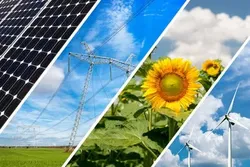
Energy System Transformation and Governance - Online Course 
This online course explores the transformation of energy systems and the governance of energy policies. It covers topics such as energy markets, energy security, energy efficiency, renewable energy, and climate change. It also examines the role of governments, businesses, and civil society in the energy transition. The course provides an understanding of the challenges and opportunities of energy system transformation. It also provides insights into the policy and regulatory frameworks needed to support the transition. ▼
ADVERTISEMENT
Course Feature
![]() Cost:
Cost:
Free
![]() Provider:
Provider:
Futurelearn
![]() Certificate:
Certificate:
No Information
![]() Language:
Language:
English
![]() Start Date:
Start Date:
Self Paced
Course Overview
❗The content presented here is sourced directly from Futurelearn platform. For comprehensive course details, including enrollment information, simply click on the 'Go to class' link on our website.
Updated in [May 25th, 2023]
This online course, Energy System Transformation and Governance, provides an overview of the current energy system and the challenges of transitioning to a more sustainable energy system. It covers the key elements of energy system transformation, including energy efficiency, renewable energy, energy storage, and energy governance. The course also examines the role of policy, regulation, and market forces in driving the transformation of the energy system.
The course is designed to provide students with an understanding of the current energy system and the challenges of transitioning to a more sustainable energy system. It covers the key elements of energy system transformation, including energy efficiency, renewable energy, energy storage, and energy governance. The course also examines the role of policy, regulation, and market forces in driving the transformation of the energy system.
The course is divided into four modules. The first module provides an overview of the current energy system and the challenges of transitioning to a more sustainable energy system. The second module covers the key elements of energy system transformation, including energy efficiency, renewable energy, energy storage, and energy governance. The third module examines the role of policy, regulation, and market forces in driving the transformation of the energy system. The fourth module focuses on the implementation of energy system transformation, including the development of energy policies, regulations, and market structures.
At the end of the course, students will have a comprehensive understanding of the current energy system and the challenges of transitioning to a more sustainable energy system. They will be able to identify the key elements of energy system transformation, understand the role of policy, regulation, and market forces in driving the transformation of the energy system, and develop strategies for the implementation of energy system transformation.
[Applications]
This online course provides an overview of energy system transformation and governance. It covers topics such as energy system transformation, energy policy, energy markets, and energy governance. After completing this course, participants will have a better understanding of the challenges and opportunities associated with energy system transformation and governance. They will also be able to apply the knowledge and skills acquired in this course to their own energy-related projects. Suggestions for applying this course include developing energy policies, designing energy markets, and implementing energy governance strategies. Additionally, participants can use the knowledge and skills acquired in this course to inform their own research and advocacy efforts.
[Career Paths]
1. Energy Policy Analyst: Energy policy analysts are responsible for researching, analyzing, and developing energy policies and regulations. They work with government agencies, industry stakeholders, and other organizations to ensure that energy policies are effective and efficient. They also provide advice and guidance on energy-related issues. The demand for energy policy analysts is expected to grow as governments and organizations continue to focus on energy efficiency and sustainability.
2. Renewable Energy Engineer: Renewable energy engineers are responsible for designing, developing, and implementing renewable energy systems. They work with a variety of technologies, such as solar, wind, and geothermal, to create efficient and cost-effective energy solutions. Renewable energy engineers are in high demand as the world continues to transition to renewable energy sources.
3. Energy Efficiency Consultant: Energy efficiency consultants are responsible for helping organizations and businesses reduce their energy consumption and costs. They analyze energy usage and develop strategies to reduce energy consumption and costs. They also provide advice on energy efficiency technologies and practices. The demand for energy efficiency consultants is expected to grow as organizations and businesses continue to focus on reducing their energy consumption and costs.
4. Energy System Analyst: Energy system analysts are responsible for analyzing energy systems and developing strategies to improve their efficiency and performance. They work with a variety of energy sources, such as solar, wind, and geothermal, to develop efficient and cost-effective energy solutions. The demand for energy system analysts is expected to grow as the world continues to transition to renewable energy sources.
[Education Paths]
1. Bachelor of Science in Energy Systems: This degree program focuses on the design, development, and implementation of energy systems. It covers topics such as energy efficiency, renewable energy, energy storage, and energy policy. Students will gain an understanding of the economic, environmental, and social impacts of energy systems, as well as the technical aspects of energy systems. This degree is becoming increasingly popular as the world moves towards a more sustainable energy future.
2. Master of Science in Energy Systems Engineering: This degree program focuses on the engineering aspects of energy systems. It covers topics such as energy efficiency, renewable energy, energy storage, and energy policy. Students will gain an understanding of the technical aspects of energy systems, as well as the economic, environmental, and social impacts of energy systems. This degree is becoming increasingly popular as the world moves towards a more sustainable energy future.
3. Doctor of Philosophy in Energy Systems: This degree program focuses on the research aspects of energy systems. It covers topics such as energy efficiency, renewable energy, energy storage, and energy policy. Students will gain an understanding of the economic, environmental, and social impacts of energy systems, as well as the technical aspects of energy systems. This degree is becoming increasingly popular as the world moves towards a more sustainable energy future.
4. Master of Business Administration in Energy Systems: This degree program focuses on the business aspects of energy systems. It covers topics such as energy efficiency, renewable energy, energy storage, and energy policy. Students will gain an understanding of the economic, environmental, and social impacts of energy systems, as well as the technical aspects of energy systems. This degree is becoming increasingly popular as the world moves towards a more sustainable energy future.
Course Provider

Provider Futurelearn's Stats at AZClass
Discussion and Reviews
0.0 (Based on 0 reviews)
Explore Similar Online Courses

Emotional Intelligence

SAP : Supply Chain Logistics in R&3

Python for Informatics: Exploring Information

Social Network Analysis

Introduction to Systematic Review and Meta-Analysis

The Analytics Edge

DCO042 - Python For Informatics

Causal Diagrams: Draw Your Assumptions Before Your Conclusions

Whole genome sequencing of bacterial genomes - tools and applications

Advanced Erosion Control Measures

Environmental Studies

Ocean - Seakeeping & Manoeuvring
 Related Categories
Related Categories
 Popular Providers
Popular Providers
Quiz
 Submitted Sucessfully
Submitted Sucessfully
1. What is the main focus of the Energy System Transformation and Governance course?
2. What type of course is Energy System Transformation and Governance?
3. What topics are covered in the Energy System Transformation and Governance course?


Start your review of Energy System Transformation and Governance - Online Course